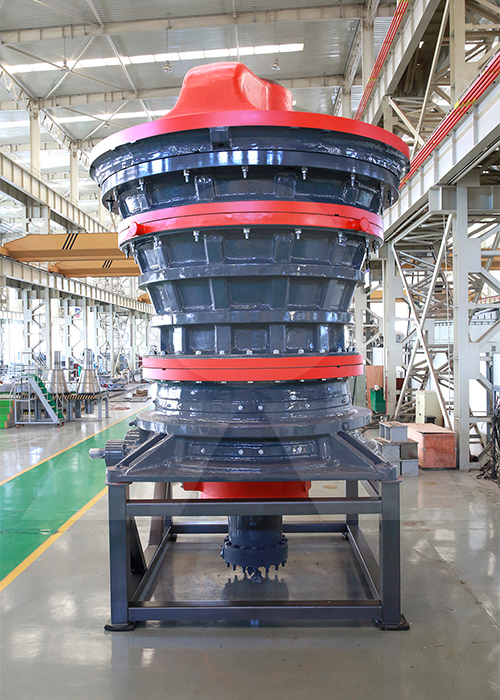The Role of Gyratory Crushers in Metallurgical Processes
Gyratory crushers play a critical role in the metallurgical industry, particularly in the crushing and processing of large volumes of ores and raw materials. As essential equipment in mining and refining, these machines are designed to handle large feed sizes and deliver uniform product output, making them indispensable in primary crushing operations in metallurgical processes.
Working Principle of Gyratory Crushers
A gyratory crusher operates by utilizing a cone-shaped crushing head that rotates within a larger concave surface. As the head rotates, the raw material is crushed between the head and the concave until the pieces are small enough to pass through the bottom of the machine. The continuous rotation of the crushing head allows the gyratory crusher to process large quantities of ore efficiently, making it suitable for processing hard and abrasive materials commonly found in metallurgy.
Importance of Gyratory Crushers in Metallurgy
- High Crushing Efficiency:
Gyratory crushers are known for their ability to handle large feed sizes and high capacities, which is essential in metallurgical plants where large volumes of ore must be processed quickly. Their high reduction ratio ensures that raw materials are broken down to the desired size in one stage, reducing the need for multiple crushing steps. - Consistent Output Quality:
In the metallurgical industry, maintaining consistent particle size distribution is crucial for downstream processes such as smelting and refining. Gyratory crushers provide uniform crushing, ensuring that the processed material is consistent in size and quality, which improves the efficiency of metallurgical processes. - Durability and Reliability:
Gyratory crushers are built to handle the toughest materials, such as iron ore, copper, and other metals used in metallurgy. Their robust design and construction enable them to withstand harsh conditions and heavy workloads, ensuring long operational lifespans and reducing downtime for maintenance. This durability is especially important in metallurgical operations, where equipment failure can cause significant production delays.
Applications in Metallurgy
- Primary Crushing of Ores:
In metallurgical plants, gyratory crushers are commonly used in the primary crushing stage to reduce large ore blocks into smaller, manageable pieces. This is a critical step in the beneficiation process, where materials like iron ore, copper ore, and nickel are reduced in size before further processing. - Material Handling Efficiency:
The large feed openings and high throughput capacities of gyratory crushers make them ideal for processing vast quantities of raw material in metallurgical plants. These machines can handle ores with high abrasiveness and hardness, ensuring that production lines remain efficient and uninterrupted. - Integration with Other Metallurgical Processes:
Gyratory crushers are often integrated into larger metallurgical systems, working alongside conveyor belts, screens, and grinding mills. This seamless integration ensures that the crushing process is aligned with other stages of material handling, leading to smoother operations and improved overall productivity.
Advantages of Gyratory Crushers in Metallurgy
- High Capacity:
Gyratory crushers can process large volumes of material, making them ideal for high-capacity mining and metallurgical operations. Their ability to crush massive amounts of ore in a single pass significantly reduces processing time and energy consumption. - Uniform Crushing:
The design of gyratory crushers ensures uniform crushing, which leads to more consistent product sizes. This consistency is vital in metallurgy, where precise material specifications are required for subsequent processes like smelting. - Low Operating Costs:
Despite their large size and high capacity, gyratory crushers are relatively cost-effective to operate. Their efficiency in handling large feed sizes and producing a uniform output helps minimize the need for additional crushing stages, reducing energy consumption and operational costs.
Conclusion
Gyratory crushers are indispensable in the metallurgical industry due to their ability to efficiently process large amounts of raw materials and ores. Their high capacity, durability, and consistent output quality make them ideal for primary crushing in metallurgical processes. By ensuring efficient material handling and reducing the need for multiple crushing stages, gyratory crushers contribute significantly to the productivity and profitability of metallurgical operations.
- > Environmental Impacts of Chromite Mining and the Role of Crawler Mobile Crushers in Indonesia
- > What Materials Are Suitable for Mobile Impact Crushers?
- > VSI Vertical Shaft Impact Crusher for Particle Shape Optimization in Concrete Aggregates
- > Robust Design and Stable Performance of Vibrating Feeders
- > Mobile Jaw Crusher with Dust Suppression System: Enhancing Efficiency and Environmental Compliance
- > The Benefits and Considerations of Second-Hand Portable Jaw Crushers in Canada
- > Transportation and Installation Considerations for Mobile Crushers
- > Impact Crushers for Gold Mining in the Middle East
Hot Product


Online




Message

